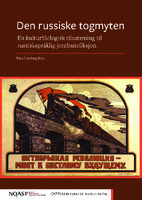Den russiske togmyten
En kulturfilologisk tilnærming til russiskspråklig jernbanefiksjon
Abstract
"How are languages and cultures affected not only by the landscapes we live in, but also by the ways in which we make our way through them? Can railway fiction contribute to illuminating questions related to a nation’s history and identity? And what makes the stories about Russian, Soviet and post-Soviet trains different from railway literature with origins in other railway nations?
Outside the country’s borders Russian and Soviet trains are likely to be associated with exotic journeys, particularly by the Trans-Siberian railway. This book explores other aspects of this vast empire’s railways. Through philological and cultural analyses, primarily of literary fiction, but also of popular cultural and documentary texts, the author demonstrates how and why the railway gradually became part of the Russian and Soviet peoples’ culture and national consciousness. She describes how metaphors and aphorisms related to trains were applied in propaganda, and subsequently became subject to linguistic play and literary deconstruction. And last, but not least this monograph shows how the railway forms a dark backdrop for literary representations of deportations, forced labour and prison camps.
The book addresses specialists and students of Russian, as well as readers with a general interest in Russia, languages, literature and cultural theory." "Hvordan påvirkes språk og kulturer, ikke bare av de landskapene vi lever i, men også av måtene vi beveger oss gjennom dem på? Kan jernbanefiksjon bidra til å belyse spørsmål knyttet til en nasjons historie og identitet? Og hva er det som gjør fortellinger om russiske, sovjetiske og postsovjetiske tog til noe annet enn toglitteratur med opphav i andre jernbanenasjoner?
Utenfor landets grenser assosieres russiske og sovjetiske tog gjerne med eksotiske reiser, spesielt med Den transsibirske jernbanen. Denne boken undersøker andre aspekter av dette vidstrakte imperiets jernbane. Gjennom filologiske og kulturfaglige analyser, primært av skjønnlitterære kilder, men også av populærkulturelle og dokumentariske tekster, drøfter forfatteren hvordan og hvorfor jernbanen gradvis ble en del av den russiske og sovjetiske befolkningens kultur og nasjonale bevissthet. Hun beskriver hvordan metaforer og aforismer relatert til tog ble anvendt i propaganda, og følgelig gjort til gjenstand for språklek og litterær dekonstruksjon. Og sist, men ikke minst viser denne monografien hvordan jernbanen danner et mørkt bakteppe for litterære representasjoner av deportasjoner, tvangsarbeid og fangeleirer.
Boken henvender seg både til spesialister, russiskstudenter og lesere med allmenn interesse for Russland, språk, litteratur og kulturteori."
Keywords
russian litterature; trains; myths; Soviet; Russia; tog; russisk litteratur; myter; Sovjet; russisk kulturDOI
10.23865/noasp.44OCN
1083019377Publisher website
https://www.cappelendamm.no/Publication date and place
Oslo, 2018Classification
Literary studies: c 1800 to c 1900
Literary studies: c 1900 to c 2000
Literary studies: fiction, novelists and prose writers


 Download
Download